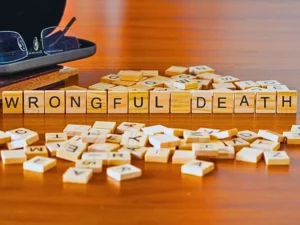Illinois law provides a statute of limitations for wrongful death, which is a window of opportunity to file a wrongful death lawsuit. Failing to file your lawsuit within the recommended timeframe, which is two years in Illinois, has severe consequences. You may have your claim barred, losing the legal right to pursue compensation, no matter how strong your case might be. Some exceptions, however, may pause or extend the two-year statute of limitations.

What Is the Significance of the Statute of Limitations?
Is there a statute of limitations on wrongful death? Illinois has a two-year statute of limitations that close relatives of a wrongfully killed person must comply with if they choose to take civil action against the liable party.
Piecing together the evidence years after an incident happened can be tricky. For this reason, the statute sets a deadline for bringing claims, creating a win-win situation for all involved parties. The deceased’s family members can build a case when the evidence is available and the memories of key witnesses are fresh. The defendant can put up a defense with fresh evidence and clear recollection.
Local courts often have a huge caseload to handle at any given time. So, lawsuits without a filing deadline would make it difficult for the court to carry out its legal mandate efficiently. The statute of limitations ensures that civil cases are heard and resolved within a specific timeframe, allowing other claims to be filed.
Some families expect to get closure on their loved one’s death by filing a wrongful death claim or lawsuit to help them with their healing. The statute offers a deadline that can give the bereaved family some time to gather evidence and present the wrongful death case in court. Within this period, the case may end with a settlement or a court decision, which may offer closure to the bereaved family.
Lawmakers nationwide, including those in Illinois, considered various factors when setting these deadlines. They considered factors like:
Balancing fairness – giving both sides enough time to gather evidence without letting years pass makes it impossible to determine what happened with accuracy.
Efficiency of the legal system – keeping a reasonable deadline helps courts move cases along smoothly, preventing a backlog of lawsuits.
Practical considerations – two years generally allows enough time for families to grieve and adjust to their loss, while still having a chance to pursue legal action if they choose.
Time Limit for Filing a Wrongful Death Lawsuit in Chicago, Illinois
In Illinois, if you lose a close family due to someone else’s negligence, you can seek justice through a wrongful death lawsuit. You must, however, take action within a specific timeframe. The timeframe, known as a statute of limitations, is set at two years from the date of the death.
What Are the Consequences of Missing the Filing Deadline?
Missing the filing deadline can have deep and far-reaching consequences. These consequences apply to the surviving family’s legal options and emotional and financial well-being. It will not matter whether you have a strong case or compelling evidence if the two-year deadline passes.
Wrongful death lawsuits aim to recover lost wages, medical expenses, and the monetary support the deceased would have provided. So, if you miss the deadline, you will bear the entire financial burden of the sudden death. This can be tragic, especially with wrongful pedestrian fatalities on the rise. Lost income and unforeseen costs may strain relationships, force difficult choices, and leave you even more vulnerable.
While the statute sets the deadline, it’s up to the judge to decide what happens if you miss it. If you miss the deadline and attempt to file a wrongful death lawsuit, the defendant can file a motion to dismiss based on the statute of limitations. The presiding judge will then review the motion and the available evidence, considering both sides’ arguments and assessing whether any exceptions to the statute apply in your case.
Based on this review, the judge will issue a ruling. If the judge finds no valid exceptions, he or she will grant the motion to dismiss and close the case. When this happens, your lawsuit is permanently barred, and you lose the right to pursue any further legal action against the defendant for the wrongful death.
Are There Exceptions to the Statute of Limitations?
The statute of limitations in Chicago, Illinois, sets a firm two-year deadline for most wrongful death claims. However, there are exceptions to this timeframe that you might explore. These exceptions help ensure justice gets served even when the time for pursuing the lawsuit or claim has passed.
One of the ways exceptions to the statute of limitations are applied in lawsuits is through tolling. Tolling means putting the timer on hold. As such, the filing deadline will stop for a certain period and then resume once the reason for the tolling ends.
In some cases, the law recognizes that a person might not even realize they have a legal claim until years after the incident. It could be because the defendant actively concealed his or her wrongdoing, the nature of the injury or harm makes it difficult to detect right away, or the injured party was legally or mentally unable to act sooner. If any of these situations apply, the statute of limitations might not take effect until the person discovers or should have discovered the injury.
Circumstances That Lead to an Extension of the Statute of Limitations
Minors who lose parents due to someone else’s negligence before reaching adulthood can be exempt from this filing deadline. Illinois law grants them the right to file a wrongful death claim later, typically within two years of reaching legal age. It acknowledges that the minors may not have realized their rights regarding lawsuits and pursuing compensation.
Lawsuits involving concealed wrongdoing, such as the dangers faced by roadside workers, can also qualify for the exception to the statutory limits. The law recognizes that if the defendant actively hides his or her wrongdoing, the clock on the statute does not begin ticking until the truth comes to light. The lawyer representing the deceased’s family must uncover the wrongdoing with evidence before filing a lawsuit.
Surviving family members might not realize that they have grounds for pursuing a wrongful death lawsuit if the wrongful death was concealed by fraudulent misrepresentation. As such, they will be entitled to an exception to the filing deadline until their lawyer uncovers the injustice. The injustice can be a case in which a medical company hides crucial information about a dangerous drug or a manufacturer fails to warn about the risks of a defective product, leading to a loved one’s death.
If a potential plaintiff is actively serving in the military, the statute of limitations is often paused during his or her service period and for a reasonable time. This way, the plaintiff can focus on his or her duties without dealing with legal deadlines and have a fair chance to seek justice upon his or her return.
A surviving family member suffering from a severe mental or physical illness after the loss of a loved one may be eligible for exemption from the two-year filing deadline. The law understands his or her vulnerability and allows the statute to be paused until he or she regains the capacity to pursue legal action. Since these exceptions are complex and vary depending on the specific circumstances, working with a lawyer can help you navigate these legal obstacles and determine if any exceptions apply to your case.
How a Lawyer Can Help Determine Exceptions to the Statute of Limitations
A wrongful death attorney can help you determine whether exceptions to the statute of limitations apply to your case. The lawyer will know how to assess your specific circumstances and identify exceptions that might apply. He or she will carefully examine the elements of your case, including:
- The nature of the legal claim
- The date of the alleged wrongdoing
- Any factors that might have prevented you from filing a lawsuit sooner
The attorney will research the laws in your jurisdiction, including statutes, court rulings, and legal doctrines. These laws must govern the statute of limitations and its potential exceptions to apply to your case. Based on the analysis, the lawyer will determine whether any exceptions could apply to your wrongful death case and justify your wish to extend the filing deadline.
If an exception is deemed applicable, the attorney will help you gather evidence to support the claim. The evidence will include medical records, expert opinions, or other documentation that substantiates the reasons for the delay in filing. The attorney may then file a motion with the court, formally requesting that the statute of limitations be tolled or extended based on the applicable exception. The decision to grant an exception to the statute of limitations lies with the judge.






